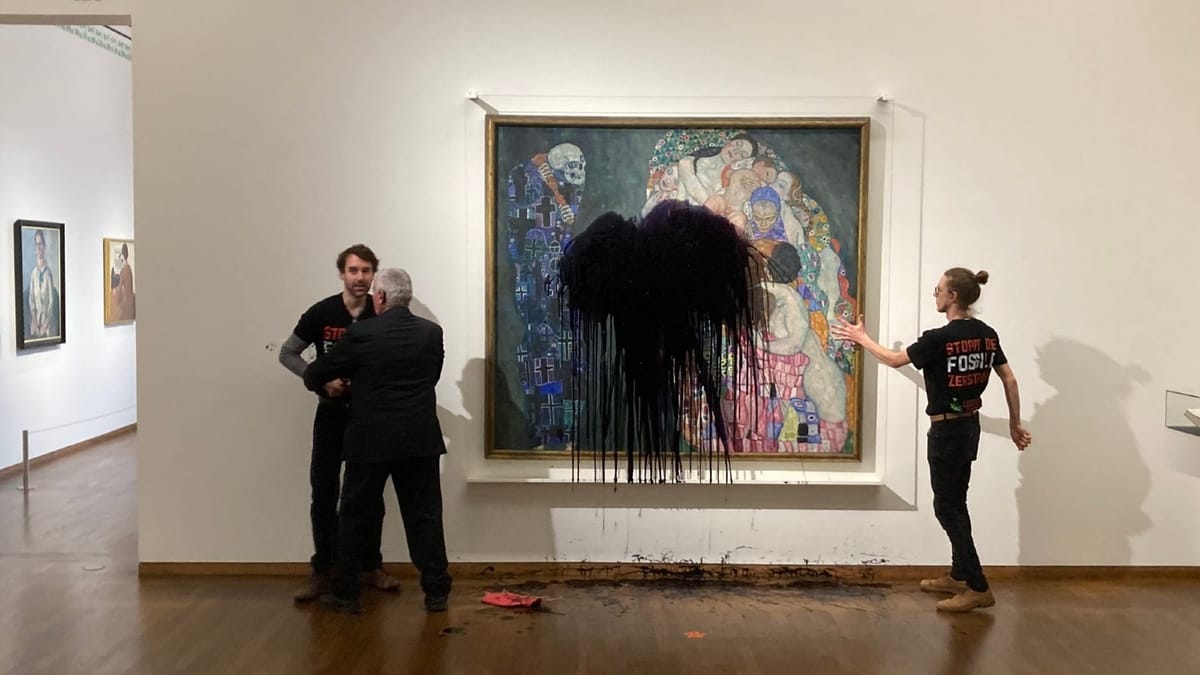
After three years of protesters gluing themselves to masterpieces, tossing soup at paintings and blocking entrances to cultural landmarks, the movement that brought climate crisis to the art world’s doorstep may finally be calling it quits.
Many of the world’s most visible climate change protest groups have announced in the past year that they would be ending their direct-action campaigns in what appears to be a coordinated shift, not just a coincidence. The groups are largely part of the same network and loosely affiliated.
Last Generation Austria, the sister organization of the German group of the same name, had organized several protests across the country, including the 2022 incident in which black paint was thrown onto the glass protecting Gustav Klimt’s paining Death and Life at the Leopold Museum then glued themselves to it to demand carbon-cutting measures.
“The paint used is non-toxic, harmless to the environment and easily removable,” Last Generation Austria said at the time. “The painting and frame are not damaged in any way.”
After years of protests, Last Generation Austria appeared to be one of the first groups to announce an end to its protests in August 2024.
“We see no prospect of success anymore. The government has distinguished itself with complete incompetence over the past two years. People have chosen fossil fuel displacement,” Last Generation Austria said in a statement at the time.
“We understand that Austria wants to remain in fossil fuel ignorance and is thus accepting complicity in the deaths of billions of people. Society has failed. This makes us incredibly sad.”
Last Generation Austria said that it would be using the remaining funds it had raised to pay for the legal fees of its activists facing criminal prosecution.
Declare Emergency, a U.S.-based group, in October announced that it would be concluding its direct action campaigns like the 2022 protest at the National Gallery of Art that saw the protective enclosure for Edgar Degas’ Little Dancer Aged 14 covered in paint.
“This decision has been made after careful consideration and reflection on the evolving landscape of climate activism and the most effective ways for our organization to contribute to the cause,” a statement on the group’s website reads.
“While our direct-action efforts are concluding, our commitment to climate justice and supporting our community remains unwavering.”
Last week, more than two years after the incident, a Declare Emergency activist who participated in that action was sentenced by a federal judge to 18 months in prison.
And the British group Just Stop Oil, which was founded in February 2022, said in March that its primary objective to seek the end of the British government’s approval of new fossil fuel projects had been met and ended its campaign of action. Its last protest was on April 26.
Just Stop Oil announced last week that three climate change protesters who threw orange cornstarch powder on three Stonehenge megaliths in 2024 were acquitted after a two-week trial.
The coordinated wind-down reflects a broader reckoning within the climate movement. Groups that once relied on spectacle are now facing harsher laws, soaring legal costs, and declining public support.
In Britain, new legislation has expanded penalties for blocking roads and “locking-on” to property. Across Europe, hundreds of activists have been fined or imprisoned for similar stunts.
The tactics themselves may also have reached a saturation point. After a wave of copycat actions targeting glass-protected artworks between 2022 and 2023, museum security tightened, legal costs soared and public support declined.
In fact, a 2022 poll from the University of Pennsylvania found that 46% of respondents said that such direct actions greatly decreased their support for addressing climate change compared to just 13% that said it increased their support.
“We don’t have to glue ourselves anymore,” the German branch of Last Generation wrote in a 2024 strategy post, signaling a shift toward other forms of public assembly. It has also since created a spinoff organization called “Neue Generation” that will continue to advocate for climate change measures.
Meanwhile, the former website for Stopp Oljeletinga in Norway has shut down and their last post on Instagram was in October 2024.
And Italy’s Ultima Generazione, which previously targeted the sculpture Laocoön and His Sons at the Vatican Museums and Sandro Botticelli's Primavera at the Uffizi Gallery in Florence, appeared to pivot toward protesting the war in Gaza through 2025, with activists participating in the global Sumud flotilla to Gaza.
